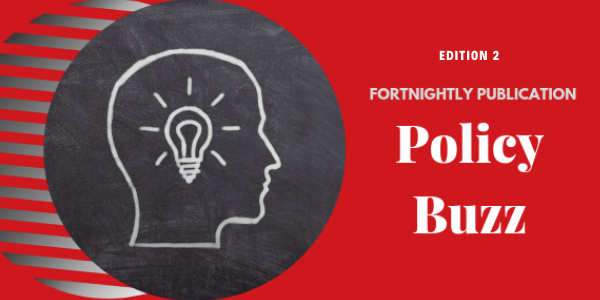
Policy Buzz: Budget Session Special
2 August 2019
Keep up-to-date with all that is happening in welfare policy with this curated selection of news, published every fortnight. This edition focuses on the Budget session of the Parliament.
Policy News
General
- The current session of the Parliament is likely to be extended a second time as per media reports. The session was originally scheduled to end on 26 July, but was extended till 7 August.
- 33 central schemes for beneficiaries living below the poverty line are to be mobilised by the government as part of a strategy to eradicate poverty by 2022, the year India celebrates 75 years of independence. The schemes range from nutrition to skill development.
- New Corporate Social Responsibility norms mooted by the government (amendment to Section 135 of the Companies Act) require mandatory spending on social activities. Failure to do so will attract jail time of up to 3 years and fines.
Education
- The deadline to submit feedback on the draft National Education Policy was revised by the Ministry of Human Resource Development to 15 August. This is the second such extension. The draft NEP, prepared by a committee under the aegis of Dr. K. Kasturirangan, has received over 70,000 responses.
Food Security
- The ‘One Nation, One Ration Card’ (ONROC) scheme was launched on a pilot basis in four states – Telangana, Andhra Pradesh, Maharashtra and Gujarat – from 1 August 2019. This will allow families who have food security cards to buy subsidised rice and wheat from any registered ration shop in these states. The scheme is envisioned to be scaled up to all states by next August, and intends to provide pan-India portability to beneficiaries provided their cards are linked to Aadhar.
Labour
- In a bid to ensure its promise of Maximum Governance, Minimum Government, the union government is planning on amalgamating all labour laws into four broad Codes – wages, industrial relation, social security and industrial safety. The first Code: Code on Wages, 2019 Bill was passed by the Lok Sabha on 30 July 2019. It will now be tabled in the Rajya Sabha.
Bills passed
The Budget Session saw the tabling and passing of a record number of Bills in the last 15 years. Till date, 39 Bills have been introduced in this session, out of which 17 have been passed by both houses. Details of some are given below:
- The Right to Information (Amendment) Bill 2019 was passed in the Lok Sabha on 22 July 2019. It was passed in the Rajya Sabha on 25 July 2019. The proposed amendments (to Sections 13 and 16) give the Union government power over tenure, salaries and terms and conditions of service of information commissioners at the Union and state levels.
In this opinion piece, Yamini Aiyar (Founder, Accountability Initiative) stresses that the RTI Amendment undermines information commissions. She writes, “as institutional mediators between citizens, their right to information and the State, it is information commissions who shape norms and limits of transparency”. The amendments “are dangerous and must be resisted”.
- The Banning of Unregulated Deposit Schemes Bill 2019 seeks to enforce a mechanism to tackle unregulated deposit schemes. In order to protect investors from ponzi schemes, the Bill saw a voice vote in its favour in the Rajya Sabha.
- The Motor Vehicles (Amendment) Bill 2019 seeks to amend the provisions of the Motor Vehicles Act of 1988. Aiming towards more vigilant road safety, the Bill is enforcing stricter penalties for road traffic violations. In addition, the government will be allowed to increase fines by 10% every year for traffic violations. The process for getting a driver’s license will be computerised and every applicant will be required to pass online tests. Aadhar card will be required as a mandatory identity proof for driver licenses.
- The National Medical Commision Bill seeks to overhaul the medical education system through the setting up of a National Medical Commission which will replace the Medical Council of India. The said commission will have responsibilities such as approving and assessing medical colleges, conducting common MBBS entrance and exit examinations, and regulating medical course fees. The aim of this Bill is to ensure affordable and accessible medical education for all.
- The Insolvency and Bankruptcy Code (Amendment) Bill, 2019, passed in the Lok Sabha on 1 August, 2019 seeks a timely process for resolution of insolvency of companies and individuals. The process has to be completed in 330 days.
- The Protection of Children from Sexual Offences (Amendment) Bill 2019 was passed unanimously in the Lok Sabha on 1 August, 2019. An amendment to the Protection of Children from Sexual Offences Act 2012, the Bill seeks for stricter punishment for sexual offences against children – increasing the minimum punishment from 7 to 10 years. Penalties related to child pornography have also been made harsher with 5 years of imprisonment plus a fine.
- The Protection of Human Rights (Amendment) Bill 2019, an amendment to Protection of Human Rights Act 1993, proposes that only a person who has been Chief Justice of India (CJI) can be made Chairperson of the National Human Rights Commission. At the state level, the Bill states that any person who has been a judge of a High Court can be made Chairperson of State Human Rights Commission.
Bills Passed in the Lok Sabha:
- The Lok Sabha passed the Code on Wages, 2019 Bill on 30 July 2019. Seeking to regulate wages/bonus payment to all employees irrespective of sectors, it will ensure statutory protection for minimum wages and timely payment for workers. The Bill aims to widen legislative protection of minimum wage to 100% of the workforce. Read here.
- The Inter-State Water Dispute (Amendment) Bill 2019 was passed in the Lok Sabha on 31 July 2019. Looking to accelerate the resolution of inter-state water disputes, this Bill will set up a single tribunal with different benches. Read more here.





